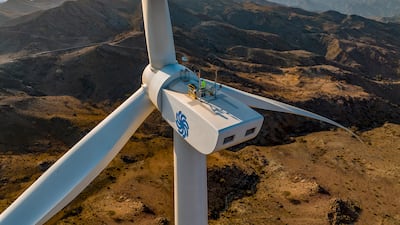Masdar is exploring the use of the Southern Gas Corridor (SGC), which is currently used to deliver natural gas from Azerbaijan to Europe, for green hydrogen, according to a senior executive.
The Abu Dhabi-based clean energy company recently completed three major solar and wind power projects in the Central Asian country, with a combined capacity of one gigawatt.
Maryam Al Mazrouei, Masdar's head of development and investment for the Commonwealth of Independent States region, said the company is advancing the development of two gigawatts of offshore wind energy, which will be used to produce green hydrogen.
Ms Al Mazrouei said that the main issues around green hydrogen include identifying potential off-takers and determining whether it will be used for the domestic market or exported to Europe.
“The SGC, which takes natural gas all the way to Europe, is also a part of the study that we are implementing, [to see if] it is really feasible to inject green hydrogen and also utilise the same infrastructure,” she told The National.
“Once we have a clear visibility, we will proceed in collaboration with our main stakeholders here.”
The 3,200-kiliometre pipeline, which passes through Georgia and Turkey, and then under the Adriatic Sea to Italy, is considered to be key to Europe’s energy security as the region looks to shift away from Russian gas imports.
Azerbaijan is looking to increase its gas supply to Europe to about 20 billion cubic metres (bcm) annually by 2027, from about 11 million bcm currently.
The country, which will host the Cop29 climate conference in November, aims to generate 30 per cent of its total power capacity from clean energy sources by 2030.
Masdar, which aims to develop 10 gigawatts of renewable energy projects in Azerbaijan, opened an office in Baku last year and pledged to strengthen its support for the country's renewable energy programme.
The initial phase will involve four gigawatts, while the second phase will be six gigawatts in size. The first phase will include two gigawatts for onshore projects and the two gigawatts to produce green hydrogen from offshore wind.
“A part of the [10 gigawatts] will cover Azerbaijan’s domestic demand, and a part of it will also be exported to neighbouring countries,” Ms Al Mazrouei said.
Masdar has actively invested in several Central Asian countries, including Kazakhstan, Uzbekistan, Kyrgyzstan, and Azerbaijan. The region boasts abundant wind and solar resources, making it ideal for the development of renewable energy projects.
“Most of these projects has been awarded through tenders, and some of these [have] also been initiated through the government-to-government bilateral channels,” Ms Al Mazrouei said.
Masdar, jointly owned by the Abu Dhabi National Energy Company, better known as Taqa, Adnoc and Mubadala, is active in 40 countries. It aims to expand its capacity to at least 100 gigawatts of renewable energy by the end of the decade from about 20 gigawatts currently.
The company is planning a possible entry into China, the world’s largest renewable energy market, a senior executive told The National in April.
The company is evaluating the market and engaging with potential partners to determine the most suitable approach for entering the Asian country, Abdulaziz Alobaidli, Masdar's chief operating officer, said at the time.






